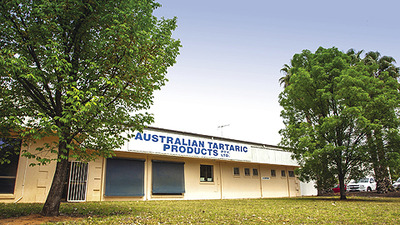Grape waste powering an energy-efficient future
Monday, 06 May, 2013
Australian Tartaric Products (ATP) is the nation’s largest manufacturer of natural tartaric acid, which plays a key role in the chemical stability, taste and pH of wine. ATP processes waste from the winemaking process, including grape marc, grape lees and sludge, to make a completely natural product from material typically bound for landfill. The company also extracts and converts residual alcohol into potable and low-grade ethanol.

ATP is located in rural Colignan, around 50 km south of Mildura in Victoria. With no access to natural gas, the company relies on trucked-in LPG to ensure its boiler runs 24/7.
“The trend and expectation was that our energy costs would become more and more expensive in years to come,” said ATP General Manager Sam Testa. “So we needed a solution that would reduce our energy costs and also decrease our carbon emissions.”
In addition, the company needed a way to reduce costs and continue producing high-quality tartaric acid to compete with synthetic Chinese imports.
Thanks to a $1.71 million grant from the Australian Government’s Clean Technology Food and Foundries Investment Program - following a $1.8 million grant from the Victorian Government’s Regional Infrastructure Development Fund in 2010 - ATP is moving more quickly to address its energy and competition challenges by building a $7.5 million renewable energy plant.
“The Australian Government funding has given us a double boost,” Testa said. “It makes the project much more financially sustainable and removes a great deal of stress for the organisation.”
The project is expected to reduce the company’s site-wide carbon emissions intensity by 75% and reduce energy costs by as much as 73%. This represents a reduction in annual energy costs of around $2.4 million.
These results will be achieved by installing a biomass boiler to burn the spent grape marc. The boiler will create the steam required to produce tartaric acid and decrease the company’s use of LPG by 70%.
In addition, the company is installing Organic Rankine Cycle technology to sit alongside the new boiler. This will take surplus steam produced by the boiler and help generate around 63% of the electricity required for ATP’s operations. It is being supplied by Australian company gT Energy Technologies.
With initiatives funded by the grant, ATP expects to:
- reduce emissions intensity by 75%,
- reduce energy costs by 73%,
- decrease use of fossil fuels by 70%, and
- generate around 63% of the company’s electricity needs on site.
Tallawang Solar Hybrid project secures access rights
Potentia Energy's proposed Tallawang Solar Hybrid project has secured access rights in the...
Fluoride boosts water-processed perovskite solar cells
Queensland University of Technology has developed a water processing method to fabricate more...
Multibuild solar installation delivered at City of Playford
Trinasolar partnered with Venergy Solar to deliver a multibuild solar installation across the...








